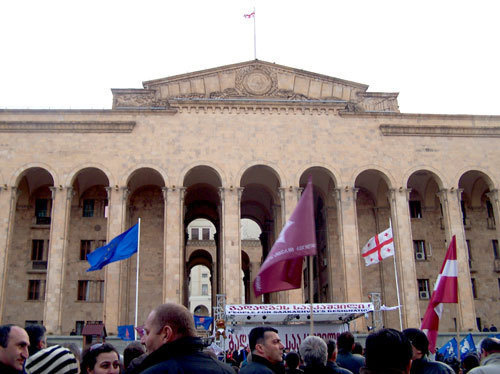
apr 09 2009, 21:00
Georgian journalist Irakliy Berulava, who is present in the venue, has treated the data about the number of participants in the protest rally in Tbilisi, reported by some mass media, to be frankly false.
"As to 50 or 80 thousand persons in Rustaveli Square - it's a lie. If we do an absolute approximation, there're some 20-25 thousand protesters - this is maximum. But the leaders of the opposition have obviously not expected this," Mr Berulava said to the "Caucasian Knot" correspondent. He has quoted the latest speeches of oppositionists.
"President of Georgia has failed to answer the hopes imposed on him in November 2003," said Irakliy Alasaniya, leader of the "Alliance for Georgia". In his opinion, President Saakashvili had promised to unite the country and solve social problems, but failed to do it. "He has exhausted out people's patience and should resign," Berulava quotes speakers as saying.
In the course of his appeal, Mr Alasaniya has also stated that the change of power should be "exclusively peaceful and gained through people's endurance."
Irakliy Berulava reports that the speech of Levan Gachechiladze, former leader of the United Opposition, was tougher and more radical. "Misha, leave before we've come! You have no right to rule the country! A coward is not wanted here!" Mr Berulava quotes Mr Gachechiladze as saying.
In her turn, Nino Burdzhanadze, ex-speaker of Georgian Parliament, has apologized for "being in power and unable to save the nation from tyranny."
However, Georgian and Russian media give highly diverging data about the number of participants of the rally. The "Newsru.com" Internet-based edition wrote at 4 p.m.: "According to different sources, in the square in front of the Parliament, in Rustaveli Avenue and adjacent streets there are from 120 to 130 thousand persons."
"It's a usual case of 'political mooneye', typical for all rallies. If an assembly is in support of official power, the media fed from the state crib will write that the rally was, say, 50,000-strong, while the opposition, covering the same action will write - 5000," Mr Berulava has noted. "Same with opposition's actions."
"The point is how you count. The Ministry of Internal Affairs (MIA) counts persons per square meter with account of the crowd density and the total area filled. Such data is not absolutely exact, but close to reality. But here we have one subtlety - these data is for an internal official report. For the media it'll be announced as prepared in bosses' offices," Dmitri Berkut, a former employee of special MIA's subdivision said to the "Caucasian Knot" correspondent.
See earlier reports: "Ivanishvili: Georgian authorities get ready to April 9, soldiers had to give away their mobile phones," "Six activists of movement "Why?" detained in Georgia," "President of Georgia invites opposition to dialogue."
Author: Dmitry Florin; Source: CK correspondent





